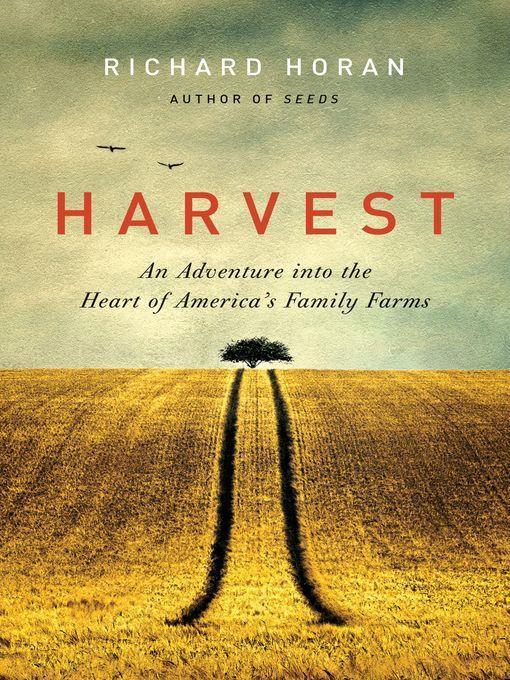
Harvest
فرمت کتاب
ebook
تاریخ انتشار
2012
نویسنده
Артур Юрьевич Газаровنویسنده
Lonely Planetنویسنده
Артур Юрьевич Газаровنویسنده
Lonely Planetنویسنده
Richard Horanناشر
Harper Perennialشابک
9780062090324
کتاب های مرتبط
- اطلاعات
- نقد و بررسی
- دیدگاه کاربران
نقد و بررسی

July 30, 2012
Horan (Seeds) offers an engaging, albeit didactic look at agriculture in America through the microcosm of harvest season at several small family farms. While his eye for the bucolic frequently recalls a nostalgic past and disdains the present, Horan un-self-consciously peppers his sharp observations with jarring platitudes that remove the reader from the task at hand. His paternalistic liberalism paints immigrant field workers as “ignorant, poor, yet so ripe with hope and determination and humility” and blinds him to the dangerous similarity between his plan for prisoner rehabilitation and this country’s agricultural, slave-holding past. This same lack of self-awareness crescendos in the harvest of wild rice, when Horan goes so far as to tell the tale in a Disneyesque caricature of native storytelling—a confusing choice. Poor narrative strategies undermine Horan’s otherwise excellent observations of the vigor of farm work and the characters he meets as he journeys from farm to farm, learning what is left of America’s small agricultural enterprises and the difficulties they face. The harvest of wheat, green beans, blueberries, tomatoes, red raspberries, wild rice, cranberries, potatoes, and walnuts will carry the reader into daydreams of hearty, satisfying work, even as the guide sometimes proves problematic. Agent: Helen Zimmerman, Helen Zimmerman Agency.

September 1, 2012
From July to October 2011, Horan (Seeds, 2011, etc.) traveled to 10 owner-operated farms to take part in the harvesting of their crops; this is his flawed but enthusiastic and highly detailed report of that experience. Though he began his travels around the United States expecting the worst, the author found reason for optimism about the future in the farmers he met. In his view, they are a source of pride and democracy, and he genuinely admires their strength of character and work ethic. During his trip, Horan helped harvest wheat in Kansas, cranberries and vegetables in Massachusetts, potatoes in Maine, raspberries and Brussels sprouts in Ohio, blueberries in New York and walnuts and grapes in California. The author provides in-depth descriptions of each farm's layout and furnishings, the meals he was served, the bed he was given, the hired help and all the family members. Best of all, he describes each crop's harvesting process. Readers interested in knowing how cranberries are pulled from bogs or what it takes to turn wild rice into an edible grain will find the answers here. Horan's love for imparting information leads him to include a host of footnotes, only some of which are relevant. By the end, readers, whom he addresses directly from time to time, may know as much about Horan as about harvesting. He reveals himself as a man of firm opinions, and he leaves the readers in no doubt about where he stands on various environmental, economic, social and political issues. Unfortunately, he also has a solid command of cliches. This could have been a fine book if the author's writing matched his energy.
COPYRIGHT(2012) Kirkus Reviews, ALL RIGHTS RESERVED.

November 15, 2012
Horan (Seeds: One Man's Serendipitous Journey to Find the Trees That Inspired Famous American Writers from Faulkner to Kerouac, Welty to Wharton) is a gifted observer of Americana. In his earlier work, he used trees as a unique lens to examine writers and writing. This time, he looks at the family farm. In a time when discussions of food and farming are deeply political and hotly argued, Horan's simple approach turns the focus back to individuals. In working on the book, he contacted small and organic farms, volunteering to help with the harvest. His travels take him from New York (blueberries) through the Midwest (green beans, red raspberries, and Brussels sprouts) to California (walnuts and grapes), with a few more stops in between. The highlight of the work is his ability to capture the voices of those he interviews--often literally, whether it is the cadence of a French potato farmer in Maine or the northeastern accents of a tomato farmer in Massachusetts. VERDICT His sense of humor is refreshing, and it's clear that he thoroughly enjoyed bringing these people's stories to a new audience. Recommended.--Marianne Stowell Bracke, Purdue Univ. Libs., West Lafayette, IN
Copyright 2012 Library Journal, LLC Used with permission.

























دیدگاه کاربران